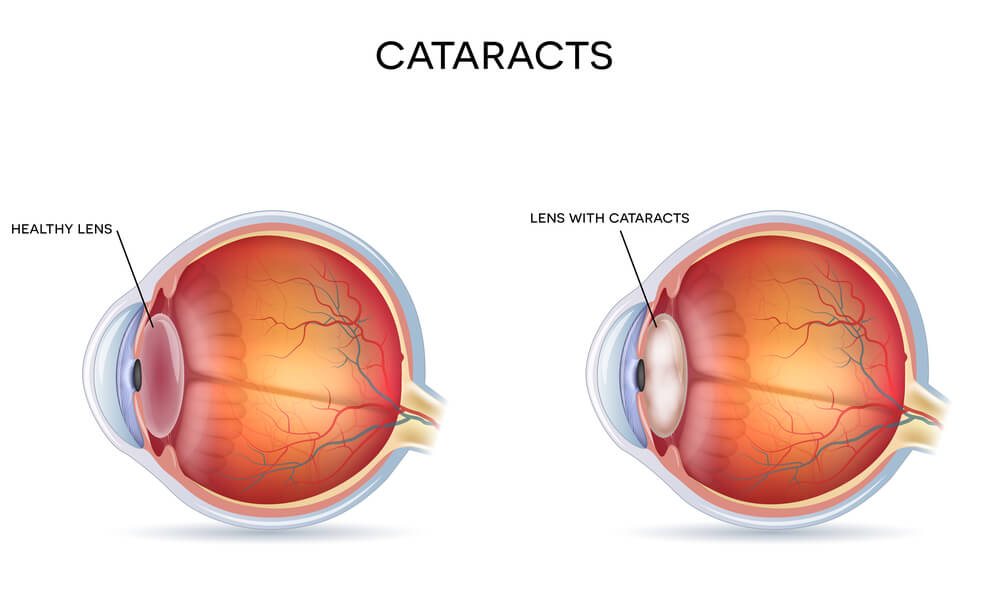Do you have cataracts impacting your ability to see clearly? You’re not alone, as they are a prevalent eye condition.
Most people will develop cataracts due to aging. However, you may not realize you have them, at least initially.
Because they develop slowly, often taking years to form, they may not cause any noticeable changes to your vision. However, they usually begin developing in adults starting in their 40s.
Since they develop slowly, they can often go unnoticed. But eventually, visual symptoms develop and worsen. Cataract surgery is the best solution if you’re losing vision due to cataracts.
There’s no reason to continue living with the frustrations of cataracts. With cataract surgery, you can regain your ability to see clearly and regain your independence, which isn’t the case with many other age-related eye conditions.
Keep reading to discover why you can reclaim your ability to see clearly with cataract surgery!
What are Cataracts?

Cataracts form on the eye’s natural lens. Your natural lens is supposed to be clear so you can see through it.
But as you get older, your lens may become cloudy, leading to visual impairments like blurry vision, double vision, seeing glare and halos, and other frustrating symptoms. This cloudiness is what’s known as a cataract.
As your natural lens becomes cloudier, it becomes more challenging to see through, negatively affecting your ability to see clearly. Although cataracts can take many years to develop and cause noticeable symptoms, receiving an early diagnosis is best.
Diagnosing cataracts early ensures your ophthalmologist can monitor their development. Regularly scheduled eye exams, especially once you turn 40, are vital to keeping your eyes healthy.
It also ensures your eye doctor can spot your cataracts as soon as they develop. Monitoring their development will help you and your eye doctor tell when your cataracts are beginning to affect your vision.
When It’s Time For Cataract Surgery

When you first start developing cataracts, they may not cause any symptoms. But as they develop, they can cause a variety of symptoms, including:
- Blurry vision
- Increased glare
- Halos around light sources
- Poor night vision
- Light sensitivity
- Colors look more muted/yellowish
- Increased falls and injuries due to impaired vision
- Double vision in only one eye
Cataract surgeons recommend treating your cataracts once they affect your quality of life. Can you no longer do basic tasks like making dinner, doing dishes, or doing loads of laundry?
Is it challenging to do things or hobbies you love because your vision continues to decline? These are often signs that you should consider cataract surgery.
Knowing how developed your cataracts are can help you and your cataract surgeon tell when your cataracts are significantly affecting your life. Gradual visual changes are often written off as part of getting older.
However, when you know you have cataracts, it becomes easier to tell when they cause your vision loss. Once cataracts affect your quality of life, the only way to treat them is with cataract surgery.
What to Expect During Cataract Surgery
Cataract surgery is the only treatment for cataracts. It’s highly effective and low-risk. It’s one of the most commonly performed medical procedures.
During the procedure, your eyes will be numbed before your cataract surgeon removes your natural lens and the cataract formed on it. A small incision is made in the eye to insert the new intraocular lens, or IOL, which replaces the natural lens.
The IOL ensures you can see clearly again. Once the IOL is put in your eye to replace your natural lens, it will unfold and be positioned to ensure optimal vision. Stitches and sutures are not needed, as the eye will begin healing after cataract surgery is complete.
Improve Your Vision More
Before you can have cataract surgery, you first have to choose an IOL. The standard IOL option is a monofocal lens.
A monofocal lens is a uniform lens that only allows you to see well at one distance, meaning you’ll still have visual aids with this IOL if you want to see at uncorrected distances. Although monofocal lenses can provide patients with good vision, other options exist.
Advanced lens implants can give you clearer vision at several distances, including up close, far away, and between. These lenses are often called lifestyle lenses because they help you lead the lifestyle you want, reducing and sometimes eliminating the need for other visual aids, especially reading glasses.
If you choose a toric lens, these advanced lens implants can correct astigmatism. Patients may also want to consider laser cataract surgery for the most precision and accuracy possible.
Laser cataract surgery gives patients a highly customized surgical experience, leading to better visual outcomes and reduced recovery time. If you want the opportunity for better vision, laser cataract surgery with an advanced lens implant is worth considering.
Cataract surgery and monofocal lenses are usually covered by health insurance. Insurance doesn’t usually cover lifestyle lenses or laser cataract surgery, meaning they have an out-of-pocket expense.
However, the added expense is worth the extra cost and investment in better vision for many patients. Talk to your cataract surgeon about your IOL options and budget; they can help you decide what lens is best for you and your needs.
Get Your Life Back

Regardless of the IOL you choose, cataract surgery can help you regain your vision and life. Advanced cataracts can make it hard to do the simplest things, from driving at night to navigating your own home.
Many people with advanced cataracts may isolate themselves at home due to embarrassment over their poor vision. Cataract surgery can help you return to your life, making you feel safer and more confident.
When you choose to improve your vision with a lifestyle lens, you can enrich your life even more! Are you ready to say goodbye to cataracts? Take the first step by requesting an appointment at Williamson Eye Center in Baton Rouge, LA! Isn’t it time to say yes to better vision?



